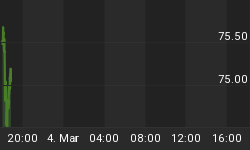(Update) Extracted from Pivotal Events
Our proprietary Peak Momentum Indicator registered in early May. As outlined below, this is a rare event and one of the more interesting examples anticipated the blowoff in gold, silver, and crude oil in January, 1980.
Last Year's Signs Of The Times:
"Home Sales Soar Sky-High"
"Experts say this is no bubble but sustainable growth driven by confidence." -- Vancouver Sun, June 3, 2005
"Measured by the increase in asset values over the past five years, the global housing boom is the biggest financial bubble in history. The bigger the boom, the bigger the bust." -- The Economist, June 23, 2005
These were from a year ago, and The Economist's view was timely as the home builders index (HGX) peaked at 291 in July and the average house price index topped in August.
The HGX has slumped 36% to the recent low of 187.
By these measures, the bubble is clearly over and the contraction in this sector has begun.
Will this lead to a bust as The Economist observed? Probably.
Our proprietary Peak Momentum Indicator topped out in early May. Such signals anticipated the blowout in banks with the LTCM disaster in 1998. (Google LTCM)
This signal measures speculative dynamics and it doesn't matter what the game is. For example, on the one in 1987 it was the stock market and the one in November, 1973 led that peak in commodities by 3 months.
However, the example in late 1979 may be the most pertinent to today's condition. The signal registered in November, 1979 and led the peak in gold and silver by 2 months.
That mania also included crude oil, which plunged from 39.50 in 1Q 1980 to 10.40 in March, 1986.
Any price decline eventually dislocates leverage taken on during the price rise and the plunge in crude took out a number of hitherto aggressive banks.
This reminds of the crash in the energy play in the mid-1980s. At congressional hearings, outraged politicians were working over the CEO of a busted Oklahoma bank. When asked where the depositors' money had gone, as reported by the Wall Street Journal, he said, "Oh, we spent it on wine, women, and song - the rest we just pissed away."
Speculation in house prices was part of that play and, as memory serves, higher end homes in Toronto and Vancouver fell to 1/3 [no typo] of their highs.
The latest signal from our Peak Momentum Indicator registered on May 9 and, while it was not as extreme as in 1998 (1.35) or in 1980 (1.37), it spiked to 1.21 and, in reversing, it says the play is over.
At the time, we noted that the signal was likely coincidental rather than leading and the rapid cooling of the action in base metals and the stock market seems appropriate.
The homebuilders index remains weak and perhaps the likely shutdown of the home as an ATM is forcing the recent plunge in retail stocks.
Although the headlines in early 1980 were mainly about precious metals and crude oil, base metals were part of the play and copper rallied from 59.6 to 143.7 on February 11, 1980. The cyclical low was 53.6 in June, 1982.
This time around, copper's high was 398 (LME) on May 12 and, so far, the low has been 305.
The reduction in speculative fever, while significant, has not encompassed all the games.
The blowout in oil, homes, and metals in 1980 was accompanied by the biggest crash in senior currency government bonds in history. Yields soared from 4.4% in 1967 to 15% in 1981. With this, Baa corporates went from 4.78% to 17.29%.
Obviously, much of the recent boom has been accompanied by falling long rates as, for example, long treasuries declined in yield from 6.73% in 2000 to 4.31% a year ago (now at 5.10%). Baa corps declined from 9% to 5.71% and the latter, with new issuance and all, represents the biggest bull market for corporate bonds in history.
Until the recent increase in long rates, this puzzled the establishment as a "Conundrum".
The clearest explanation is that all classes of bonds became another asset class that was bid up with the other but more widely celebrated asset classes.
This important financial sector has shown excesses on the upside possibly equivalent to the downside in 1981.
Of interest is that the retrospective Peak Momentum reading in 1980 was also a "buy" on bonds.
Now it's a cyclical "sell" on most corporate bonds, which have been very much part of an outstanding speculation.
A breakdown in lower grade bonds, which is best monitored by credit spreads, will mark the end of the mania in risk and that will likely mark the beginning of a severe leg down in stocks, commodities, and residential real estate.















